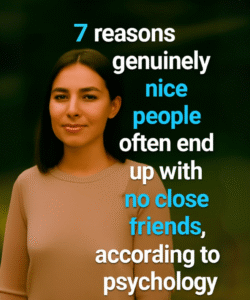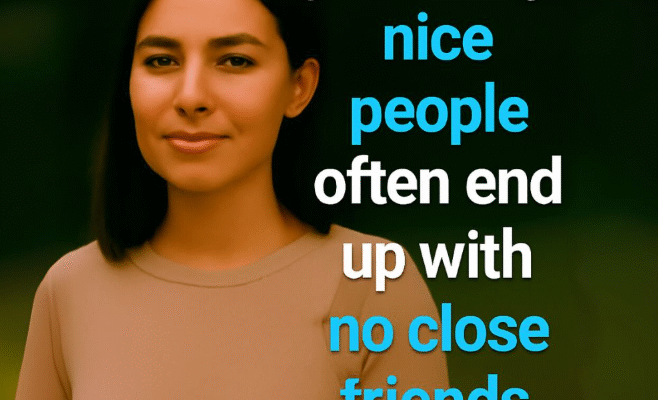
7 Reasons Genuinely Nice People Often End Up With No Close Friends, According to Psychology
In a world that praises kindness and empathy, it seems unfair that genuinely nice people often find themselves lonely or without close friends. They’re the ones who listen, care deeply, and give without expecting anything in return—yet they’re also the ones who get ghosted, forgotten, or taken for granted. Psychology offers some compelling reasons why this happens, and understanding them can help kind-hearted people protect their energy while still staying true to who they are.
Here are seven psychological explanations for why genuinely nice people often end up without close friends—and what it really says about human relationships.
1. They Give Too Much Without Setting Boundaries
One of the core traits of genuinely nice people is selflessness. They love to help, listen, and show up when others need them. But this very strength can also become their biggest weakness.
According to Dr. Brené Brown, boundaries are an essential part of compassion. People who constantly say “yes” to others without taking care of themselves often end up emotionally drained. When someone is always available, others may subconsciously start seeing them as an option rather than a priority.
Over time, this imbalance leads to one-sided friendships where the nice person becomes the listener, problem-solver, or emotional caretaker—but rarely receives the same in return. It’s not that others are intentionally cruel—it’s that the nice person never sets limits on what they can give, so people assume they can give endlessly.
2. Their Empathy Attracts Emotional “Takers”
Psychologically, kindness is magnetic—but not always to the right people. Research from the Journal of Personality and Social Psychology shows that highly empathetic individuals tend to attract those with narcissistic or self-centered traits.
Why? Because emotional “takers” subconsciously sense that nice people are safe and forgiving. They know they can make mistakes, disappear for weeks, or talk only about themselves—and still be accepted. The result? Nice people become emotional dumping grounds for others’ problems, while their own needs go unnoticed.
Ironically, their biggest strength—their empathy—becomes a beacon for those who will exploit it.
3. They Fear Conflict, So Problems Go Unspoken
Nice people often go out of their way to avoid hurting anyone’s feelings. They downplay slights, brush off disrespect, and stay quiet even when they feel undervalued. Psychologists call this conflict avoidance behavior.
The problem is, healthy relationships require honest communication—even when it’s uncomfortable. By refusing to address issues, nice people accidentally create distance. Their friends might assume everything’s fine when, in truth, resentment quietly grows beneath the surface.
Over time, these unresolved emotions turn into emotional withdrawal. The nice person stops reaching out, not out of anger, but from exhaustion. And because they never expressed their frustration, their friends often have no idea why the friendship faded.
4. They Overestimate How Much Others Care
Genuinely nice people often project their own depth of care onto others. They assume that because they value loyalty and connection, their friends do too. This psychological tendency—called empathic projection—creates false expectations.
When those expectations aren’t met, it leads to deep disappointment. A nice person might feel heartbroken when a friend forgets their birthday or doesn’t check in during hard times—because they themselves would never do that.
Unfortunately, not everyone connects at the same emotional intensity. Some people are simply less attuned, less expressive, or more self-focused. For nice people, realizing that not everyone loves with the same sincerity can be a painful but necessary wake-up call.
5. Their Positivity Can Be Misinterpreted as Superficial
Being positive and kind doesn’t always translate to being “real” in the eyes of others. In fact, psychological research shows that overly agreeable people are sometimes perceived as inauthentic.
Because they avoid negativity, sarcasm, or criticism, others might assume they’re “too nice” to be genuine—or that they can’t handle deeper emotions. Ironically, the very thing that defines them—their warmth—can make them seem distant or hard to relate to.
Many people mistake calmness for shallowness, when in reality, nice people often hide their pain behind smiles. They choose kindness even when they’re hurting, but that emotional restraint sometimes prevents deeper, more raw connections from forming.
6. They Don’t Prioritize Themselves, So Others Don’t Either
Psychologically speaking, people treat you the way you teach them to. If you constantly put others first, they subconsciously learn that your time, energy, and emotions are less valuable.
Nice people often struggle with self-worth tied to usefulness. They believe they must earn love by being helpful, generous, or self-sacrificing. But friendship shouldn’t be a transaction—it should be mutual care.
Because they rarely express their own needs, nice people end up surrounded by people who take more than they give. They become “the reliable one,” not “the cherished one.” Over time, that realization can lead to painful loneliness—being surrounded by people, yet feeling completely unseen.
7. They Outgrow People Without Realizing It
Finally, one of the most bittersweet truths psychology teaches is that growth often leads to isolation. Nice people tend to evolve emotionally. They reflect, forgive, and seek peace. But not everyone grows at the same pace.
As they mature, they may start to notice that many of their old friendships were built on convenience rather than connection—shared workplaces, neighborhoods, or routines. When those circumstances change, the friendships quietly fade.
It’s not always anyone’s fault. It’s simply that nice people outgrow environments—and people—that no longer align with their energy. Their hearts expand, but their circles shrink.
This kind of loneliness isn’t about rejection—it’s about evolution. It’s what happens when you value emotional honesty and depth in a world still comfortable with surface-level connections.
The Deeper Truth: Being “Nice” and Being “Loved” Aren’t the Same
Psychologists remind us that kindness is not a guarantee of closeness. Being nice makes you likable, but not necessarily loved. True connection requires more than generosity—it requires vulnerability, reciprocity, and boundaries.
Nice people often struggle with that balance because they believe that saying “no” or expressing pain will drive others away. But in truth, boundaries don’t push people away—they filter out the ones who never valued you in the first place.
The reality is, loneliness among kind people isn’t a sign of failure. It’s a sign that they give love in a world that often doesn’t know how to return it properly.
How to Protect Your Heart Without Losing Your Kindness
If you recognize yourself in these patterns, the goal isn’t to stop being nice—it’s to start being wise with your kindness. Here’s what psychologists recommend:
-
Set emotional boundaries. Saying no doesn’t make you unkind—it makes you emotionally responsible.
-
Notice reciprocity. If you’re always the one reaching out, pause. See who shows up when you stop.
-
Value depth over quantity. A few genuine connections will nourish you more than dozens of shallow ones.
-
Be authentic, not agreeable. Share your truth, even when it’s uncomfortable. That’s how real intimacy begins.
At the end of the day, genuinely nice people often walk lonely paths—not because they’re unworthy of love, but because they love in ways the world hasn’t learned to match yet

